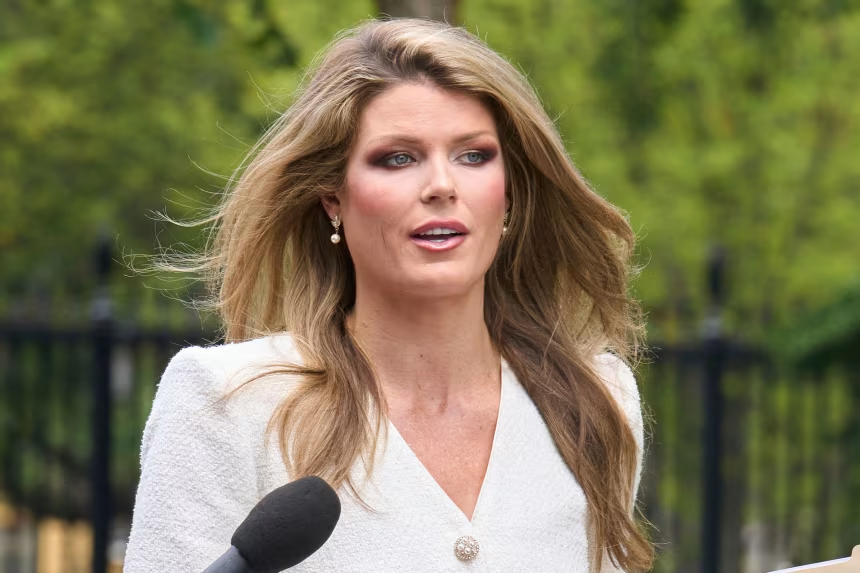In a major legal development on Thursday, New York Attorney General Letitia James announced that her legal team will seek to dismiss her recent indictment, citing concerns over the appointment of President Donald Trump’s handpicked federal prosecutor, Lindsey Halligan. The announcement comes amidst mounting scrutiny of Halligan’s role as U.S. Attorney for the Eastern District of Virginia, raising questions about impartiality in high-profile federal cases.
According to court filings submitted by James’ attorneys, the motion to dismiss the indictment will argue that Halligan’s appointment was unlawful, potentially undermining the legitimacy of the charges against the state’s top legal officer. The brief filing, spanning just two pages, also included a footnote referencing another high-profile case: former FBI Director James Comey is pursuing a similar motion, also challenging Halligan’s appointment. James’ legal team suggested that the motions in both cases “should likely be consolidated,” signaling potential coordinated litigation against the federal prosecutor’s office.
James, who was indicted on October 9 on two felony counts—bank fraud and making false statements to a financial institution—is scheduled to appear in Norfolk, Virginia, on Friday at 11 a.m. ET. A source familiar with the case confirmed that Halligan is expected to attend the hearing. Meanwhile, a hearing on Comey’s motion to dismiss is slated for November 13.
Barrage of Legal Challenges Against Halligan
James’ move is not just limited to questioning Halligan’s appointment. Her attorneys also filed a separate motion seeking to bar federal prosecutors from speaking to the media about the case, emphasizing the importance of a fair and impartial trial. According to court documents, Halligan reportedly communicated with a journalist just two days after persuading a federal grand jury to indict James. The conversation, which took place over the encrypted messaging platform Signal, included Halligan’s thoughts on the “credibility and general strength of the evidence presented to the grand jury.”
James’ legal team described these communications as a “stunning disclosure of internal government information,” highlighting that they violate multiple ethical and procedural standards. “These extrajudicial statements and prejudicial disclosures by any prosecutor, let alone one purporting to be the U.S. Attorney, run afoul of and violate the Federal Rules of Criminal Procedure, the Code of Federal Regulations, this Court’s Local Rules, various rules of ethical and professional responsibility, and DOJ’s Justice Manual,” the filing said.
The attorneys argued that such behavior not only undermines the integrity of the ongoing case but also threatens the fairness of the trial. They requested the court to intervene and issue an order preventing Halligan and other prosecutors from making any further public statements or disclosures related to the investigation or the parties involved. The proposed order would also require prosecutors to maintain a record of all communications with media members, ensuring accountability and compliance with professional guidelines.
“As the prosecutor who is ‘handling the case’ against Attorney General James and purporting to be the U.S. Attorney, Ms. Halligan is supposed to be the standard-bearer of the professional responsibility rules rather than the District’s violator-in-chief,” the filing noted, highlighting the unusual circumstances surrounding Halligan’s role.
Political and Legal Ramifications
This legal confrontation has significant implications, both politically and legally. Letitia James, a Democrat, has long been a prominent figure in New York politics, known for taking on high-profile cases against major corporations and public officials. Her indictment has already drawn national attention, with critics on both sides of the aisle scrutinizing the timing and legitimacy of the charges.
The challenge to Halligan’s appointment adds a new layer of complexity. Critics argue that the handpicked U.S. Attorney may face conflicts of interest in pursuing cases involving prominent political figures, while supporters contend that any allegations of misconduct should be independently investigated rather than automatically disqualifying her. Legal analysts note that if James’ motion to dismiss is successful, it could set a precedent for other federal indictments where questions arise about the propriety of a prosecutor’s appointment.
Meanwhile, the motion to bar extrajudicial communications could also reshape how federal prosecutors interact with the media, particularly in politically sensitive cases. While public information and press releases are standard in many federal investigations, James’ attorneys argue that direct messaging with journalists about ongoing cases risks prejudicing juries and influencing public perception before evidence is fully presented in court.
Upcoming Court Proceedings
James’ scheduled court appearance in Norfolk will be closely watched by both legal experts and political observers. While the motion to dismiss is expected to be a central focus, other procedural matters—including restrictions on media communication—are likely to take center stage as well. In parallel, Comey’s upcoming hearing in November may provide additional insight into the broader challenge to Halligan’s appointment and the federal prosecutor’s role in politically sensitive cases.
The unfolding legal battles underscore the intense scrutiny surrounding federal prosecutions of high-profile public officials, especially when questions about the legitimacy of appointments and procedural fairness arise. Observers anticipate that these cases could influence future DOJ policies regarding the appointment and conduct of U.S. Attorneys, as well as the boundaries of media engagement during ongoing investigations.
As the legal proceedings move forward, both James and her team are signaling that they intend to vigorously challenge the indictment and seek protective measures to ensure impartiality, accountability, and transparency in the judicial process.

